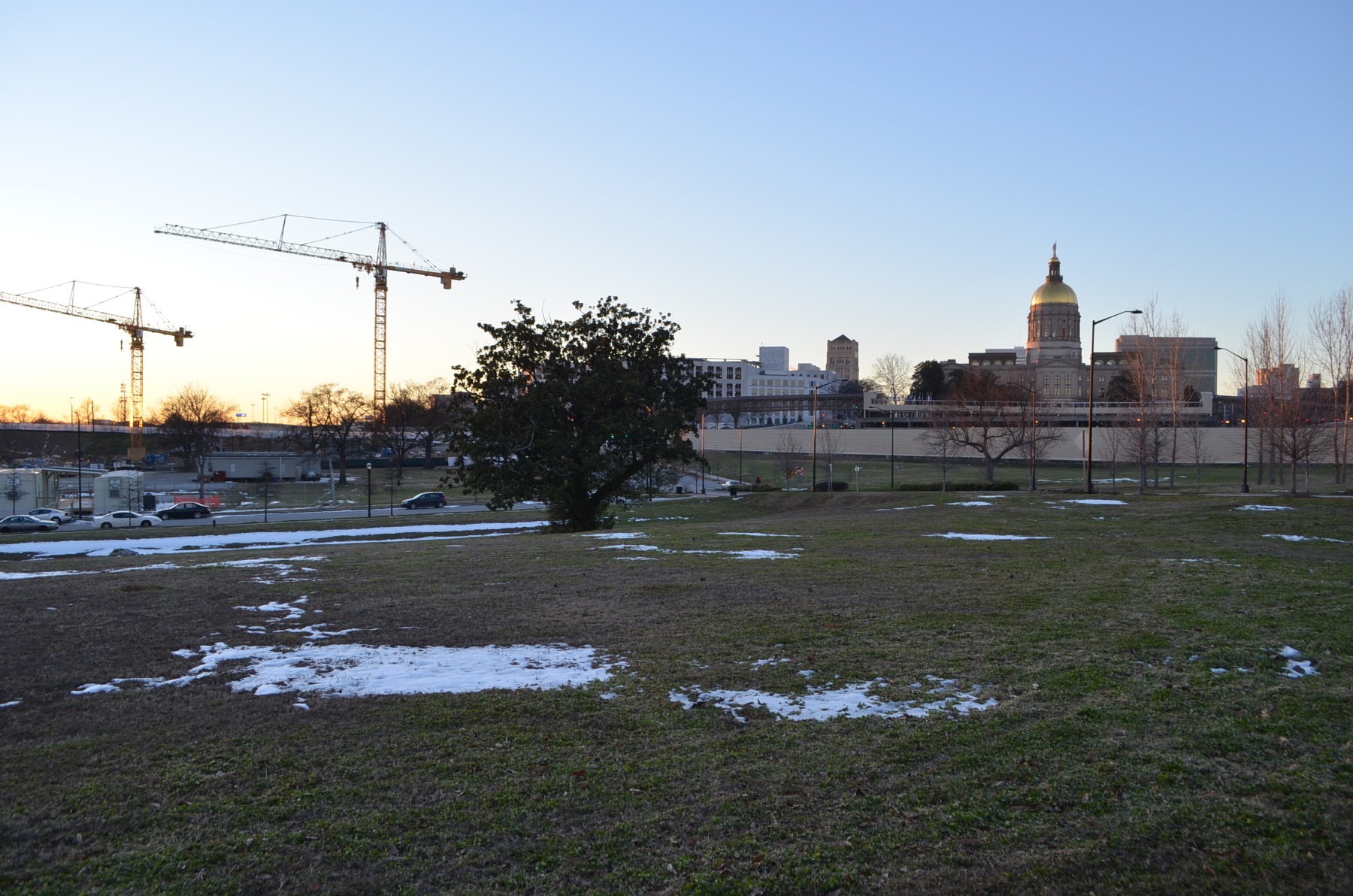Battle Over Empty Land Touches On Atlanta’s Approach To Affordable Housing

The Atlanta Housing Authority is suing a developer to keep control of roughly 100 acres of vacant land scattered around Atlanta.
Stephannie Stokes / WABE
In Atlanta, a handful of vacant properties have become the focus of a bitter legal battle.
On one side is the city’s low-income housing agency. And on the other is a developer, who was the agency’s longtime partner.
The legal dispute centers on who has rights to the land, but it also highlights Atlanta’s longstanding approach to affordable housing.
A Land Deal
Catherine Buell stands just off Memorial Drive, near downtown Atlanta. The Georgia state Capitol is visible in the distance, along with Atlanta City Hall.
But Buell, who’s president of the Atlanta Housing Authority, is focused on the empty field immediately before her. This used to be public housing.
“We’re standing on the site of the Capitol Homes former housing project,” Buell said.
The housing authority demolished the project more than a decade ago. Later, it built new housing on about half of the land.
But these 10 acres have sat empty. And now, they’re part of a lawsuit.
“We have about 100 acres that we’ve owned since the 1940s, 1950s that we currently want to retain ownership of,” Buell said.
The problem is, about seven years ago, the person who used to have Buell’s job signed the land over to a developer, Integral, as an incentive.
Integral partnered with the housing authority to build the new housing on this site and at the three other sites that are wrapped up in the case.
All are former public housing properties and several are now in valuable parts of the city — in the Old Fourth Ward, on the Westside and along Memorial Drive. Buell values the acres at $138 million.
But she said this deal allows the developer to buy the properties for a fraction of that — about $12 million.
And on top of that, Integral wouldn’t even need to build affordable housing. Buell said this is at a time when intown areas really need more low-income units, especially for the working class.
“We think it’s really important as you see thousands of units of luxury housing being built, that they’re able to live and partake in those developments as well,” she said. “And that’s really what we’re fighting about.”
The Atlanta Housing Authority has sued Integral to get out of the deal. The city of Atlanta has also filed a lawsuit of its own.
The Atlanta Model
But the developer, Integral, is fighting about something, too, although it takes some background to understand.
CEO Egbert Perry has worked with the Atlanta Housing Authority for more than two decades, going back to when there were struggling housing projects across the city.
Together, Integral and the authority came up with a whole new approach to housing. It became known as the Atlanta Model.
Perry, who is now also chairman of the board at Fannie Mae, has no doubts about its impact. When asked if he felt his work with the agency contributed to today’s housing market, Perry responded, “I don’t just feel that. I know that.”
“So many parts of the city that were considered not livable are now livable,” he said.
The Atlanta Model is premised on the idea that it is wrong to concentrate low-income units. Instead, you need to mix in apartments for the middle class, too.
Perry said that’s because they draw investment, and investment leads to amenities.
“What we need to do is have housing affordability in places where people who have choice would want to live,” he said.
Perry can point to one such development he built with the housing authority from the window of his downtown office tower.
“So everything you see over there, all of those residential units,” he said.
He’s gesturing to what was once a neglected project. Now it’s Centennial Place. It has a YMCA, a charter school and also Perry’s home. He actually lives there.
“I’m looking at the roof of my house right now,” Perry said.
He said this Atlanta Model is exactly what he’s trying to bring to those properties that are caught up in the lawsuit.
The empty land on those sites is surrounded by housing that has a high level of low-income units — between 60 to 80 percent of units. Now, Perry said there’s a need for the other components.
“At this point now, our primary objective is to bring up the incomes in the communities so you can attract grocery stores, restaurants, etc.,” he said.
That way the neighborhoods can become sustainable, according to Perry.
And Integral disagrees that it’s getting a big discount. As part of the deal, there’s a partnership that would give the housing authority a 50 percent share in the land.
Who Does It Benefit?
Now, it’s important to note that not everyone is a believer in the Atlanta Model. Professors like Deirdre Oakley at Georgia State University have studied the approach.
“I’m not saying that the Atlanta Model hasn’t changed the city,” Oakley said. “But you have to ask who is it benefiting.”
Or who is it not benefiting. Oakley said most former public housing residents don’t live in the mixed-income developments because there aren’t enough units for them.
And keep in mind that Atlanta demolished all of its projects. A few hundred acres still remain vacant.
Yet, the Atlanta Housing Authority said it isn’t backing away from the Atlanta Model. It’s grateful for the work Perry’s done.
Buell said the areas around the land in dispute are simply a lot wealthier now.
“Old Fourth Ward is actually selling townhomes now for the cheap price of $800,000,” she said.
So, she said adding a lot of affordable housing in these neighborhoods isn’t going to stop things like grocery stores and restaurants from coming in.
Ultimately, how the land is developed will be decided by a judge. The case is in Fulton County Superior Court.








